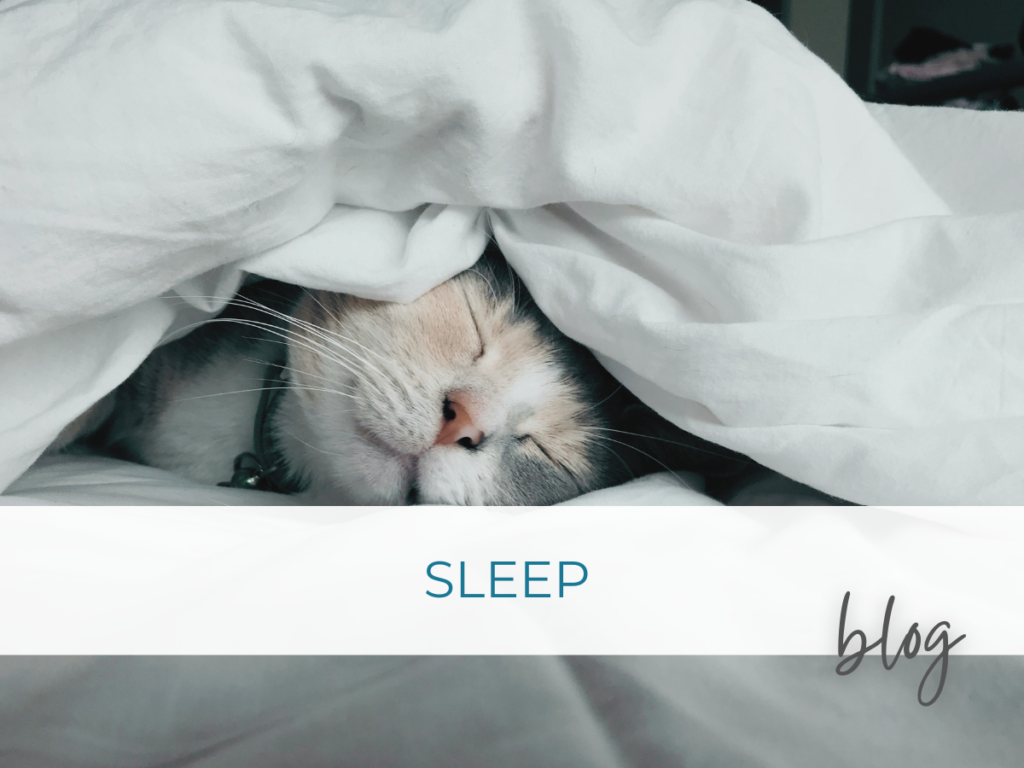The Physiology of Sleep
There are two key hormones involved in sleep – CORTISOL and MELATONIN. They govern our sleep-wake cycle, or our CIRCADIAN RHYTHM.
Melatonin
Melatonin is often referred to as the “sleep hormone” because it plays a central role in regulating the sleep-wake cycle. It is produced by the pineal gland in the brain in response to darkness and helps signal to the body that it is time to prepare for sleep.
Cortisol
Known as the “stress hormone,” cortisol maintains wakefulness during the day. Cortisol levels are typically high in the morning and gradually decrease throughout the day, reaching their lowest point in the evening.
Imbalances in cortisol levels, such as elevated levels at night due to chronic stress, can disrupt your ability to fall asleep and experience restful sleep.
Waking
Cortisol will double within the first hour of waking. For this reason, a consistent wake-up time is key. Have you ever slept in on the weekend and then felt fatigued and foggy all day, even though you got more sleep? This is because you missed the window of your cortisol doubling… and so you just feel flat all day.
There is also intriguing new neuroscience showing that getting sunlight on your eyes within 5 minutes of waking can stimulate the production of cortisol in the frontal lobe, leading to more focused alertness throughout the day. This means getting outside, without sunglasses (glasses are ok) and getting sun on your face first thing.
In our northern climate, most of us wake up in complete darkness. The next best thing to sunlight on our retinas is turning on as many lights in our home as possible first thing in the morning.
Sleep
Melatonin starts to rise around 8pm and is critical in helping us get into a deep sleep. I often describe Cortisol and Melatonin as “on and off light switches”, to simplify our understanding. When Melatonin starts to rise at nighttime, the cortisol switch shuts off… or at least it is meant to.
Melatonin is disrupted by light hitting our retinas. This is why it is so important to sleep in a dark bedroom, undisturbed by lights from electronics and city lights. If you get up in the night to urinate, it is important to stay in the dark as much as possible.
When Cortisol Won’t Shut Off
Sometimes Cortisol won’t shut off at nighttime. This can lead to an overactive mind, as soon as your head hits the pillow, despite the fact that you are exhausted. Sound familiar?
Elevated nighttime cortisol can also lead to waking up in the middle of the night, usually between 2 and 4 am, with anxious thoughts, or an active brain. It can lead to lying there for hours, unable to shut your brain off and fall back to sleep.
To much cortisol output is usually from chronic stress, even if the stress is already in the past, this cortisol dominance can persist.
Sleep as the Key-Stone for Metabolic Health
Sleep is a critical factor in metabolic health, body composition and hormone balance.
In one study, the control group woke up at the same time every day. The test group was told to vary their wake up times, sometimes 7:00, sometimes 8:30 etc. The group with variable wake up times gained an average of 15 pounds over the course of the study!
Cortisol causes the liver to convert glycogen, the stored form of sugar, into glucose. Then, the glucose is dumped into the bloodstream as blood sugar, leading to chronic high blood sugar and the development of insulin resistance.
Cortisol also can cause adipose tissue or body fat to accumulate around the mid-section and can cause muscle wasting. Elevated cortisol can rob away the raw materials that your body uses to make Testosterone. Testosterone, for both men and women, is an important hormone in the growth and maintenance of muscle mass, a key component of metabolic health.
One bad night of sleep can affect your blood sugar metabolism and hormone balance for a week! Yikes!! No wonder sleep is so important.
The Hours before Midnight Count
Your body descends into the deep, delta wave sleep more during the first half of the night. Delta wave or deep sleep is critical for physical restoration, hormone regulation, and memory consolidation. This is why the hours of sleep before midnight matter so much. It is more important that you go to bed early vs. getting the same number of hours of sleep, going to bed later. Rule of thumb for better metabolic health: in bed by 10:00 and asleep before 11:00.
Tips for a Better Sleep
Your naturopathic doctor can measure your cortisol curve and has many additional tools including vitamins, minerals, nutrients and botanicals that have all been demonstrated to balance your cortisol curve and improve your circadian rhythm.
But great sleep starts with you.
Direct from the Wild Collective Curriculum: “The reclamation of your sleep is the ultimate expression of self-care.”








